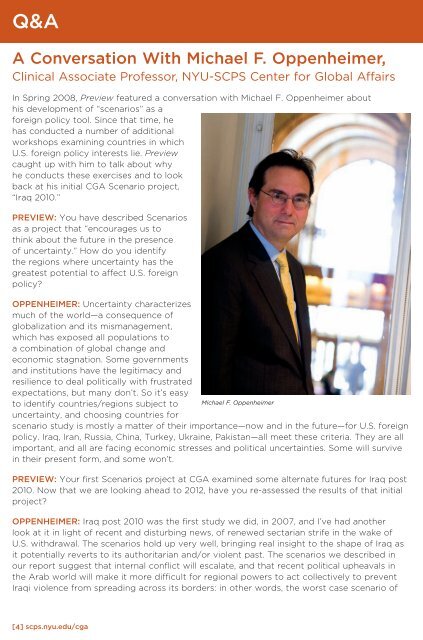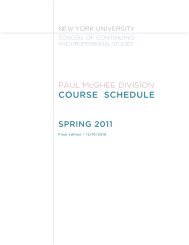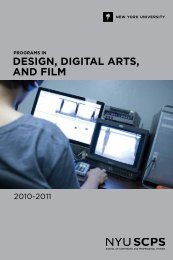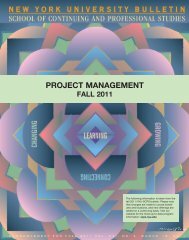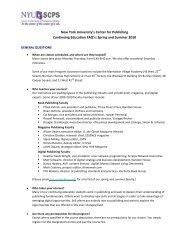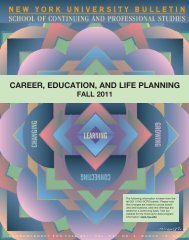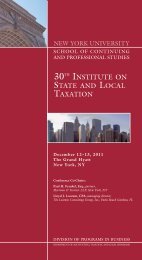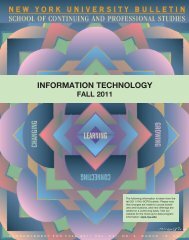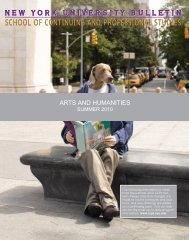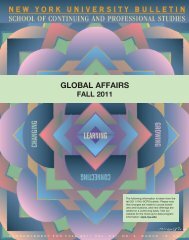Preview - School of Continuing and Professional Studies - New York ...
Preview - School of Continuing and Professional Studies - New York ...
Preview - School of Continuing and Professional Studies - New York ...
You also want an ePaper? Increase the reach of your titles
YUMPU automatically turns print PDFs into web optimized ePapers that Google loves.
Q&A<br />
A Conversation With Michael F. Oppenheimer,<br />
Clinical Associate Pr<strong>of</strong>essor, NYU-SCPS Center for Global Affairs<br />
In Spring 2008, <strong>Preview</strong> featured a conversation with Michael F. Oppenheimer about<br />
his development <strong>of</strong> “scenarios” as a<br />
foreign policy tool. Since that time, he<br />
has conducted a number <strong>of</strong> additional<br />
workshops examining countries in which<br />
U.S. foreign policy interests lie. <strong>Preview</strong><br />
caught up with him to talk about why<br />
he conducts these exercises <strong>and</strong> to look<br />
back at his initial CGA Scenario project,<br />
“Iraq 2010.”<br />
PREVIEW: You have described Scenarios<br />
as a project that “encourages us to<br />
think about the future in the presence<br />
<strong>of</strong> uncertainty.” How do you identify<br />
the regions where uncertainty has the<br />
greatest potential to affect U.S. foreign<br />
policy?<br />
OPPENHEIMER: Uncertainty characterizes<br />
much <strong>of</strong> the world—a consequence <strong>of</strong><br />
globalization <strong>and</strong> its mismanagement,<br />
which has exposed all populations to<br />
a combination <strong>of</strong> global change <strong>and</strong><br />
economic stagnation. Some governments<br />
<strong>and</strong> institutions have the legitimacy <strong>and</strong><br />
resilience to deal politically with frustrated<br />
expectations, but many don’t. So it’s easy<br />
to identify countries/regions subject to Michael F. Oppenheimer<br />
uncertainty, <strong>and</strong> choosing countries for<br />
scenario study is mostly a matter <strong>of</strong> their importance—now <strong>and</strong> in the future—for U.S. foreign<br />
policy. Iraq, Iran, Russia, China, Turkey, Ukraine, Pakistan—all meet these criteria. They are all<br />
important, <strong>and</strong> all are facing economic stresses <strong>and</strong> political uncertainties. Some will survive<br />
in their present form, <strong>and</strong> some won’t.<br />
PREVIEW: Your first Scenarios project at CGA examined some alternate futures for Iraq post<br />
2010. Now that we are looking ahead to 2012, have you re-assessed the results <strong>of</strong> that initial<br />
project?<br />
OPPENHEIMER: Iraq post 2010 was the first study we did, in 2007, <strong>and</strong> I’ve had another<br />
look at it in light <strong>of</strong> recent <strong>and</strong> disturbing news, <strong>of</strong> renewed sectarian strife in the wake <strong>of</strong><br />
U.S. withdrawal. The scenarios hold up very well, bringing real insight to the shape <strong>of</strong> Iraq as<br />
it potentially reverts to its authoritarian <strong>and</strong>/or violent past. The scenarios we described in<br />
our report suggest that internal conflict will escalate, <strong>and</strong> that recent political upheavals in<br />
the Arab world will make it more difficult for regional powers to act collectively to prevent<br />
Iraqi violence from spreading across its borders: in other words, the worst case scenario <strong>of</strong><br />
[4] scps.nyu.edu/cga


